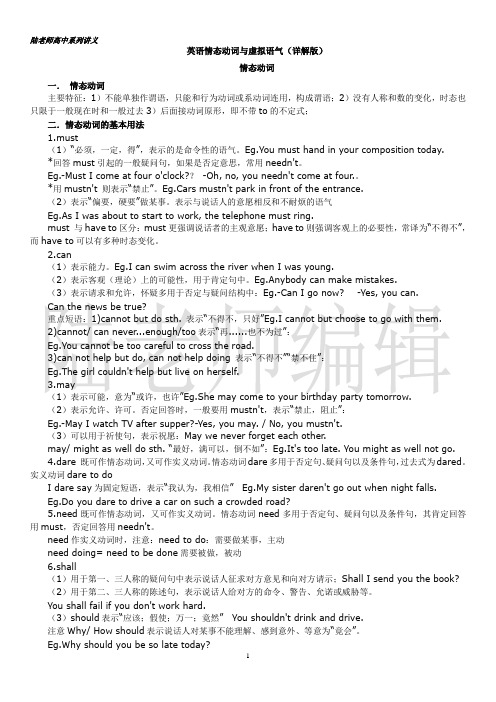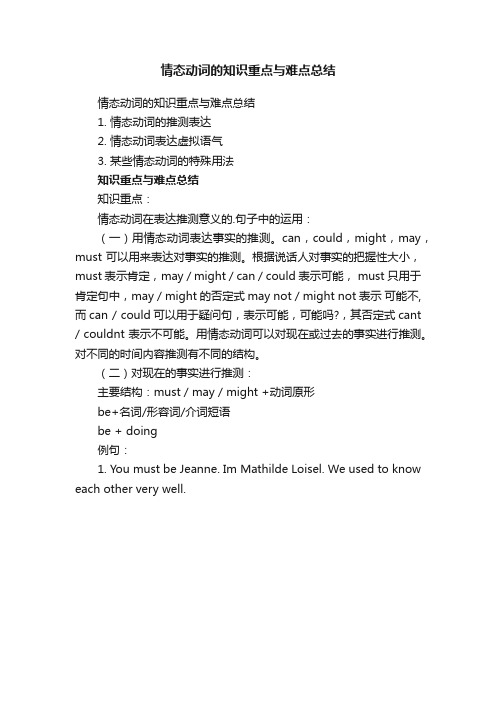情态动词和虚拟语气重点与难点
高考英语情态动词和虚拟语气考情分析

高考英语情态动词和虚拟语气考情分析情态动词的用法复杂多变,在高考试题中占的比重一直比较稳定,每年总有一至两个题,可以单独考查,也可以结合虚拟语气考查。
命题者常常利用语境和句子之间意义上的细微差别来考查考生对情态动词的理解和掌握,难度也保持较为稳定的趋势。
其考点主要包括:1.考查情态动词的基本用法。
如:can 和could 的用法及区别;will 和would 的用法及区别;must 的用法;shall 用于不同人称时的用法和should 的各种用法;need 的用法等。
2.考查情态动词的“推测”功能。
如:can,could,may,might,must 皆可表示推测,使用时要注意以下几点:(1)注意语气。
语气较强用must, cannot,couldn't; 语气较弱用may,might 或can,could; (2)注意句式。
在肯定句中,一般用may,might,must; 在否定句、疑问句中常用can,could; (3)注意时态。
表示对现在或将来的情况的推测,此时通常用“情态动词+动词原形”结构;表示对现在或将来正在进行的情况进行推测,通常用“情态动词+进行体”结构;表示对过去情况的推测,通常用“情态动词+完成体”结构。
3.考查情态动词的特殊用法。
如:(1)cannot/can't 与too/over/enough/perfectly/sufficiently 等词连用,意为“ 越…… 越……”“ 无论怎样……,……也不为过”“决不会……,……够(过)”。
(2)cannot wait to do sth 意为“急于做某事”。
(3)would 和used to 的区别;can 和be able to 的区别。
(4)“may/might well+动词原形”意为“理应,有足够的理由”;“may/might as well+动词原形”意为“还不如,不妨,还是……的好”。
(5)must 意为“偏要,硬要”;can 用在肯定句中,可以表示客观上的可能性;shall 用在法律、条约、协定等文件中可以表示义务、规定等;should 表示估计或推测上的“应该”,意为“可能,该,估计,按理应当”;will 可以表示习惯性和倾向性,意为“惯于,老是,终归是”等。
高中英语关于情态动词和虚拟语气的知识点总结

关于情态动词和虚拟语气的知识点总结【考纲解读】1、准确把握情态动词表允许、推测、判断等用法;2、准确把握情态动词在虚拟语气句子结构中的使用;3、wish,as/though,if only,would rather+从句,It is time+从句等句型中的虚拟语气;4、表示“坚持、命令、建议、要求”的词语后及各类从句中的虚拟语气;5、虚拟语气在非真实条件句中的运用。
【知识点梳理】情态动词表示说话人的语气和情绪,本身词义不全,不能单独作谓语,后面必须与动词原形一起构成谓语。
情态动词没有人称和数的变化,有的情态动词有过去式。
常见的情态动词有can, could, may, might, must, have to, shall, should, will, would, ought to, need, dare等。
一、情态动词的基本用法和重点点击(一)can和could基本用法1.表示体力或脑力(知识、技能)所产生的能力。
He could read books in English when he was only five.他只有五岁的时候就会读英文书籍了。
2.表示客观的可能性Anybody can make mistakes.任何一个人都有可能犯错误。
3.表示请求建议,用could 比 can语气更委婉 (回答用原形)Could you be here at eight o’clock tomorrow morning?你可不可以明天上午8点钟来这儿呢?4.表示允许、许可,用could 比 can更委婉客气。
Could/Can I borrow your reference books?我可以借用一下你的参考书吗?重点点击1.否定句、疑问句和感叹句中,表示怀疑、惊异、不相信的态度。
Can it be true? 难道这是真的?You can't be serious! 你怕不是在开玩笑吧!Oh, dear, what on earth can this mean? 哎呀,亲爱的,这究竟是意味着什么?2.表示“经过努力后终于能……”用be able toThe fire spread the building quickly but everybody was able to escape.大火迅速蔓延到整幢大楼,但大家都逃了出来。
中学五年级必掌握知识点总结虚拟语气与情态动词的连用与情境适用

中学五年级必掌握知识点总结虚拟语气与情态动词的连用与情境适用中学五年级必掌握知识点总结:虚拟语气与情态动词的连用与情境适用在中学五年级的学习中,掌握虚拟语气与情态动词的连用是非常重要的知识点。
虚拟语气表示一种假设或者与事实相反的情况,而情态动词则用于表达能力、可能性、必要性等情态。
本篇文章将对五年级学生必须掌握的虚拟语气和情态动词进行总结,帮助学生更好地理解和应用这两个语法点。
一、虚拟语气的使用虚拟语气用于表示假设、愿望、建议、命令、推测等情况。
在使用虚拟语气时,需要注意以下几个方面:1. 表达假设:当我们假设某个情况是虚构的、不可能或者未实现的时候,就需要使用虚拟语气。
例如:If I were a bird, I would fly in the sky.(如果我是一只鸟,我就会在空中飞翔。
)2. 表达愿望:虚拟语气也常用于表达愿望或者对现实情况的否定。
例如:I wish I could go to the party tonight.(我希望我今晚能去参加聚会。
)3. 表达建议:虚拟语气还可以用于表示建议或者要求。
例如:I suggest that he arrive on time.(我建议他准时到达。
)二、情态动词的连用与情境适用情态动词是一种特殊的助动词,用于表示说话人的意愿、建议、推测、能力等情态。
在使用情态动词时,需要根据具体情境进行适当的选择。
1. Can / CouldCan用于表示能力、许可或者请求。
Could则表示过去的能力、许可或者请求。
例如:I can swim across the river.(我会游过河。
)Could you please pass me the book?(请你把书递给我好吗?)2. May / MightMay用于表示许可、可能或者推测,表示现实中存在的可能性。
Might则表示较小的可能性或者猜测。
例如:May I go to the bathroom?(我可以去上洗手间吗?)He might be sleeping.(他可能正在睡觉。
情态动词与虚拟语气(详解版)(新版)

英语情态动词与虚拟语气(详解版)情态动词一.情态动词主要特征:1)不能单独作谓语,只能和行为动词或系动词连用,构成谓语;2)没有人称和数的变化,时态也只限于一般现在时和一般过去3)后面接动词原形,即不带to的不定式;二.情态动词的基本用法1.must(1)“必须,一定,得”,表示的是命令性的语气。
Eg.You must hand in your composition today.*回答must引起的一般疑问句,如果是否定意思,常用needn't。
Eg.-Must I come at four o'clock??-Oh, no, you needn't come at four.。
*用mustn't 则表示“禁止”。
Eg.Cars mustn't park in front of the entrance.(2)表示“偏要,硬要”做某事。
表示与说话人的意愿相反和不耐烦的语气Eg.As I was about to start to work, the telephone must ring.must 与have to区分:must更强调说话者的主观意愿;have to则强调客观上的必要性,常译为“不得不”,而have to可以有多种时态变化。
2.can(1)表示能力。
Eg.I can swim across the river when I was young.(2)表示客观(理论)上的可能性,用于肯定句中。
Eg.Anybody can make mistakes.(3)表示请求和允许,怀疑多用于否定与疑问结构中:Eg.-Can I go now? -Yes, you can.Can the news be true?重点短语:1)cannot but do sth. 表示“不得不,只好”Eg.I cannot but choose to go with them.2)cannot/ can never...enough/too表示“再......也不为过”:Eg.You cannot be too careful to cross the road.3)can not help but do, can not help doing 表示“不得不”“禁不住”:Eg.The girl couldn't help but live on herself.3.may(1)表示可能,意为“或许,也许”Eg.She may come to your birthday party tomorrow.(2)表示允许、许可。
高考英语情态动词和虚拟语气考点总结及真题解析

考点13 情态动词和虚拟语气【命题解读】英语中常用的情态动词主要有can,could,may,might,must,will,would,shall,should,ought to,dare,need,used to,had better等。
在学习情态动词时应注意以下几点:同一情态动词表示不同的意义的情况;情态动词后跟各种形式的用法;尤其要注意"情态动词+完成式"是高考中的重点所在。
对虚拟语气的考查重点在于根据句子的语境灵活多样地运用虚拟语气,宾语从句中虚拟语气的应用,交际用语中为表示委婉而使用的虚拟语气,含蓄条件句中的虚拟语气,以及特殊句型中的虚拟语气等。
【命题预测】情态动词是2021年各地高考试题中的必考项目,每年高考单独命题区的单项填空必有一道考查情态动词的项目。
新课标卷主要在语法填空和短文改错中考查。
考点依次是:推测(可能性)→请求/允许→必要性→特殊用法。
试题的立意不偏不怪,但有效信息越来越隐蔽,语境越来越真实,考查角度越来越细致,这些因素在很大程度上增加了试题的难度。
情态动词和虚拟语气与动词的时态和语态相结合的考查是近年来高考的趋势。
【复习建议】情态动词:1. 掌握情态动词的基本用法;2. 掌握情态动词表达"情感、态度、语气等"方面的用法。
虚拟语气:1. 掌握虚拟语气的基本用法;2. 掌握含蓄虚拟条件句的用法;3. 掌握主从句时间不一致的虚拟条件句的用法;情态动词考向一情态动词的基本用法1)can,could与be able to1.表示能力,意为"能,会"。
☞Many people can use the computer.许多人会用电脑。
☞If you have a good sleep,you will be able to work out this problem.如果你好好睡一觉,你将能够解出这道题。
☞I could have worked out the problem,but I was too nervous.我本来可以解决这个问题,但我太紧张了。
高考 情态动词和虚拟语气 知识点总结

情态动词和虚拟语气一、情态动词的用法要点1.表能力CanBe able to 表现在的能力Will be able to 表将来的能量力CouldWas/were able to 表过去的能力Could have + 过去分词表过去有能力但未做2.表推测(可能性)a.可能性分为客观的可能性和具体事情实际发生的可能性两种。
所谓客观的(理论的)可能性即并不涉及具体某事是否会发生,此种用法常常可以说明人或事物的特征情态动词can可用于肯定句中表示可观的(理论的)可能性,而表示具体事情实际发生的可能性时,can一般不用于肯定句。
b.表示具体事情实际发生的可能性①表示集体事情实际发生的可能性层次比较②表示具体事情实际发生的可能性时,may, must常用于肯定句,一般不用于否定句和疑问句(may not表示“可能不”);can常用于否定句、疑问句或感叹句中,表示疑惑、惊讶或不相信等意思;could既可用于肯定句又可用于否定句、疑问句中。
③would, could, should, might并不一定与过去时间有关,而表示可能性弱于他们相应的现在时形式④should表推测时,表示确定或可能有的未来或期望,即合乎理想的情况或结果3.表示请求、允许、允诺a.当对方是决策者时,你代表你(们)自己(I, we),或代表第三者(he, she, they)向对方(you)请示或提出建议时用:①shall/may(might)/can(could) I/we…?②shall he/she/they…?③would/will you…?b.Could/might/would/should表委婉语气c.Shall与第二、三人称连用用于陈述句,表示说话者的命令、警告、威胁;当宣布法律规定时,shall也由此用法4.表必要性a.must常用来表示必要性,以为“必须”①must + do sth. (现在或将来)必须做某事②don’t have to do sth./don’t need to do sth./needn’t do sth.(现在或将来)不必做某事③表示过去没必要做某事,分以下情况:Needn’t have done sth.本来不必做而做了某事Didn’t have to do sth./didn’t need to do sth./It was not necessary to so sth.(过去)不必做(不强调是否做了)某事b.should也可以表示必要性,意为“(义务上)应该”。
2012年高考英语《情态动词和虚拟语气》教案

《情态动词和虚拟语气》教案一、教学目标1、情态动词的常见考点;2、虚拟语气的常见考点。
二、教学重难点1、教学重点:情态动词的常见考点;虚拟语气的常见考点。
2、教学难点:虚拟语气的常见考点。
三、教学过程(一)问题排行榜(Hit the charts)1、情态动词的常见考点都有哪些?2、虚拟语气的常见考点都有哪些?(二)攻克难点(Overcome difficulties)情态动词与虚拟语气是高中语法学习的难点和重点。
高考英语完成句子对情态动词的考查主要涉及常见情态动词的基本用法,特别侧重于情态动词表推测的用法和特殊结构中情态动词的应用。
高考完成句子对虚拟语气的考查重点在于根据句子的语境灵活多样地运用虚拟语气,宾语从句中虚拟语气的应用,交际用语中为表委婉而使用的虚拟语气,含蓄条件句中的虚拟语气,以及特殊句型中的虚拟语气等。
五年高考已考测试点:情态动词与完成式;宾语从句、同位语从句、条件句中的虚拟语气;情态动词的推测功能;should/can等情态动词的基本用法。
1、情态动词的常见考点都有哪些?考点一情态动词与完成式“情态动词+have+过去分词”结构是情态动词专项考查的难点和重点,记住以下最常考查的结构:①must have done 过去一定做了某事②can’t/couldn’t have done 过去不可能做了某事③may/might have done 过去可能做了某事④needn’t have done本来没有必要做而实际做了某事⑤could have done本来能够做而实际没有做某事⑦shouldn't/oughtn't to have done本来不该做而实际做了某事考点二情态动词的推测功能can,could,may,might,must 皆可表示推测,使用时要注意以下几点:①注意语气。
语气较强用must, cannot,couldn't;语气较弱may,might或can,could;②注意句式。
情态动词的知识重点与难点总结

情态动词的知识重点与难点总结
情态动词的知识重点与难点总结
1. 情态动词的推测表达
2. 情态动词表达虚拟语气
3. 某些情态动词的特殊用法
知识重点与难点总结
知识重点:
情态动词在表达推测意义的.句子中的运用:
(一)用情态动词表达事实的推测。
can,could,might,may,must可以用来表达对事实的推测。
根据说话人对事实的把握性大小,must表示肯定,may / might / can / could表示可能, must只用于肯定句中,may / might的否定式may not / might not表示可能不, 而can / could可以用于疑问句,表示可能,可能吗?,其否定式cant / couldnt 表示不可能。
用情态动词可以对现在或过去的事实进行推测。
对不同的时间内容推测有不同的结构。
(二)对现在的事实进行推测:
主要结构:must / may / might +动词原形
be+名词/形容词/介词短语
be + doing
例句:
1. You must be Jeanne. Im Mathilde Loisel. We used to know each other very well.。
- 1、下载文档前请自行甄别文档内容的完整性,平台不提供额外的编辑、内容补充、找答案等附加服务。
- 2、"仅部分预览"的文档,不可在线预览部分如存在完整性等问题,可反馈申请退款(可完整预览的文档不适用该条件!)。
- 3、如文档侵犯您的权益,请联系客服反馈,我们会尽快为您处理(人工客服工作时间:9:00-18:30)。
情态动词和虚拟语气情态动词(一)表示推测的情态动词对现在或将来情况推测,用情态动词+do / be / be doing…;对过去的推测,用情态动词+have done / been…;表示肯定推测的情态动词must, should / ought to, may, might, 否定推测,常用can’t / couldn’t,译为“根本不可能”、“想必不会”,表示推测的语气非常肯定,may not, might not译为“可能不”、“也许不”,表示推测的语气不很肯定。
(1) must表示推测,意为“一定……”,只能用于肯定句中。
must have done意为:一定做过某事或某事肯定发生了。
例如:(NMET2007 江苏)—She looks very happy. She ______ have passed the exam.—I guess so. It’s not difficult after all.A. shouldB. couldC. mustD. might【解析】句意为:她看上去很高兴,一定是通过了考试。
【答案】C(2) should (not) / ought (not) to在中表示根据常规或常识推测,表示“某事应该或不应该发生”。
例如:(NMET2007全国I)—How’s your tour around the North Lake? Is it beautiful?—It ________ be, but it is now heavily polluted.A. willB. wouldC. shouldD. must【解析】should此处表示推测,意为“应该”。
【答案】C②(NMET2005上海)There _________ be any difficulty about passing the road test since you have practiced a lot in the driving school.A. mustn’tB. shan’tC. shouldn’tD. needn’t【解析】句意:既然你在驾校进行了大量训练,那么通过道路测试按理不应该有困难。
【答案】C(3) can, could表达推测时,一般用于疑问句和否定句中;can用于肯定句中表示一种理论上的可能性,并不牵涉是否真的会发生,在这种用法中can只能与动词原形连用例如:①(NMET2008浙江)You ______ be hungry already — you had lunch only two hours ago!A. wouldn’tB. can’tC. mustn’tD. needn’t②(NMET2008天津)She ______ have left school, for her bike is still here.A. can’tB. wouldn’tC. shouldn’tD. needn’t③(NMET2008福建)It is usually warm in my hometown in March, but it _____ be rather cold sometimes.A. mustB. canC. shouldD. would④(NMET2008辽宁)Peter ____ be really difficult at times even though he’s a nice person in general.A. shallB. shouldC. canD. must【解析】①②两个考题中can用于表示否定的推测,意为:不可能,一定不会;③④两个考题中can表示理论上的可能性,翻译为:有时候会……。
【答案】① B ② A ③ B ④ C(4)may (not) / might (not)表达一种不太把握的推测,意为“或许,可能”例如:① (NMET2008全国II) Liza ___ well not want to go on the trip --- she hates traveling.A. willB. canC. mustD. may【解析】may well为固定搭配,意为:很可能,极有可能。
【答案】D② (NMET2008四川) Although this ____ sound like a simple task, great care is needed.A. mustB. mayC. shallD. should【解析】这听起来或许是一项简单的任务,但却需要极大的细心。
【答案】B③ (NMET2008重庆)—I can’t find my purse anywhere.—You __ have lost it while shopping.A. mayB. canC. shouldD. would【解析】结合语境可知,回答者是在提醒对方:或许购物时把钱包丢了。
【答案】A(二)表达虚拟语气的情态动词对过去的一种结果的假设或虚拟,用情态动词+have done这一结构,常用的有以下几个情态动词:(1) should (not) / ought (not) to have done本(不)应该做某事,但却没有做或做了,含有责备或后悔之意。
例如:(NMET2008江苏)—I’m sorry. I _________at you the other day.—Forget it. I was a bit out of control myself.A. shouldn’t shoutB. shouldn’t have shoutedC. mustn’t shout C. mustn’t have shouted【解析】对不起,我那天本不应该对你大喊大叫的。
【答案】B(2) could have done本来能够做某事但未做。
例如:(NMET2008山东)Thank you for all your hard work last week. I don’t think we ______ it without you.A. can manageB. could have managedC. could manageD. can have managed【解析】根据题干中所给出的时间last week可知我们已经做完了工作,已经完成,故排除A、C 两项,再结合could have done表示虚拟语气以及与前面的I don’t think…,故说话者想表达的意思是:离开了你,我们本不可能完成这项工作。
【答案】B(3) needn’t have done本没有必要做某事但却做了。
要注意needn’t do则表达“没有必要去做某事”,时间上应该是现在或将来。
例如:①(NMET2005福建)—Catherine, I have cleaned the room for you.—Thanks. You ________ it. I could manage it myself.A. needn’t doB. needn’t have doneC. mustn’t doD. shouldn’t have done【解析】根据句意可知Catherine对对方为她打扫了房间表示感谢并提到对方不必为她打扫房间。
【答案】B②(NMET2007上海春) The boss has given everyone a special holiday, so we go to work tomorrow.A. can’tB. mustn’tC. needn’tD. shouldn’t【解析】老板给所有的员工放了假,所以我们明天不必再去上班。
【答案】C(4)would (not) have done本来(不)会发生某事,但却(发生了)或没有发生。
常用于虚拟条件句或含蓄虚拟条件引导的虚拟语气,表示对过去所发生事情结果的假设。
例如:(NMET2001上海春) He hesitated for a moment before kicking the ball, otherwise, he ________ a goal.A. had scoredB. scoredC. would scoreD. would have scored【解析】句中otherwise为含蓄条件,相当于if he had not hesitated for a moment before kicking the ball,这是对过去的一种虚拟假设。
【答案】D(5) might have done表示“本来可能……”,但实际上没有发生的事。
例如:(NMET2008江西)What a pity! Considering his ability and experience, he ________ better.A. need have doneB. must have doneC. can have doneD. might have done【解析】真是可惜!考虑到他的能力和经验,他本来可以做得更好的。
【答案】D(三)表达“情感、态度、语气” 等方面的情态动词1. must表达“情感、态度、语气”主要有以下用法:(1) 表示主观的义务和必要,主要用于肯定句和疑问句,意思为“必须……,得……,要……”;由must引起的疑问句,肯定回答要用must或have to,否定回答要用needn’t或don’t have to,意思是“不必”。
另外,must与have to都可以表示“必须”这一含义。
must表示一种主观的需要,而have to表示一种客观的需要,意思是“不得不”,其否定形式是don’ have to。
例如:(NMET2008陕西)-What sort of house do you want to have? Something big?--Well, it ______ be big--that's not important.A. mustn'tB. needn'tC. can'tD. won't【解析】Something big?此处意为:Must it be big? 回答者的意思是:房子不必太大—那并不重要。
【答案】B(2) must的否定形式mustn’t表示禁止,意思是“不能,不许”。
例如:(2008上海春)When I was young, I was told that I ______ play with matchesA. wouldn'tB. needn'tC. mustn'tD. daren't 【解析】当我年轻的时候,(家人)就一直告诫我千万不要玩火柴。
